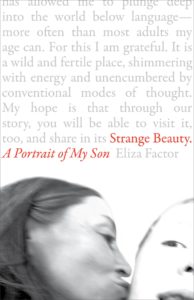
 Review by Michelle Everett Wilbert
Review by Michelle Everett Wilbert
I was 41 years old, a midwife and the mother of three children when our youngest daughter was born with spina bifida; a spinal defect of the earliest weeks of fetal development wherein the spinal cord fails to close properly. The ensuing sixteen years have been times of great joy and some sadness and frustration as we’ve tried—and often failed—to navigate what we’ve come to refer to as “disability world” in our pursuit of a life for our daughter outside a system of “services” designed to support people with disabilities which too often results in further segregation and marginalization. The deeper truths of living life with a child with a disability are found through engaging the necessary and unavoidable dualism of embracing the “Strange Beauty”—the title of this sensitively crafted memoir by Eliza Factor—of living alongside a beloved child who cannot co-exist comfortably within a larger culture still rife with barriers to full inclusion. While we argue on social media about the continued, wincing reality of prejudice of all kinds, most people remain unaware of and insensitive to the needs and experiences of people with disabilities and their families.
Factor does an admirable and thorough job of combining a deeply personal and nuanced exploration of her own journey with her son, her family, and her community, and the ongoing struggles of families to work within the maze of medical and social systems designed to care for and support people with disabilities that are overrun with bureaucracy and insufficient funding. She deftly and gently probes her own feelings, responses and decisions while continually offering gratitude not only for her beloved son, Felix, but for her husband, family and friends, and her willingness to both accept—and question—the inequities and disparities built into the system even as she continues to try to access them for her son and family.
Strange Beauty begins with the story of Factor’s pregnancy, the discovery of Felix’s various disabilities, and the causes and prognosis offered by a variety of medical experts all of whom are unable to really define the extent or limits of his disability in terms that are in any way predictive. Eventually, everyone realizes that getting to know Felix and learning to follow where he leads is the path forward and through journal entries and vivid descriptions of events, we are taken by the hand to walk along as Factor retraces the steps of life with her son.
Factor is at her best when she’s describing the challenges involved in accomplishing the most mundane tasks and errands while hauling necessary equipment and accompaniments on one arm and a child in the other onto subways and up and down stairs while trying not to bump into people, trip or drop her child. She is candid and open as she expresses the fatigue and frustration a parent feels when one clinician recommends that a child be seen by a particular specialist “as soon as possible” only to find out that she can’t get an appointment for weeks or months—and she leans in with palpable rawness as she talks about the hardest, most exhausting days and nights with Felix. As she relays the inevitable complexities of finding help for her child, she thoughtfully weaves a thread throughout her memoir about the ways in which social position and financial security—or the lack thereof—factor in the lives of parents of children faced with unique challenges. She expresses an acute awareness of her privilege: white, educated, and affluent, and able, then, to access the best care for her son while realizing that even with all of these advantages, living life with Felix is often painful, difficult, bewildering and just plain hard. Her sense of concern for those families who do not have her resources becomes a motivating force for social change and action on behalf of her son and other children with disabilities and their families.
This lovely memoir is honest, compelling and thoughtful. Parents of children with disabilities will find it a testament to love and commitment as well as a needed narrative of intimate commiseration. The book has its strongest potential, perhaps, in serving as a catalyst for deeper sharing and understanding while providing a blueprint for changing attitudes about disability through the simple, time-honored and human need for storytelling–allowing others inside the “Strange Beauty” of life with an extraordinary child.
Strange Beauty
by Eliza Factor
Parallax Press, 2017, $18.95 (paper)
ISBN 9781941529720
Michelle Wilbert is a writer, book reviewer, music programmer for two Detroit-area venues, and spiritual director in private practice. She is wife and mother of four young adult children and a retired midwife
